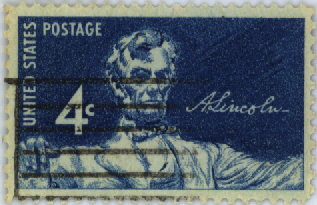< Previous Page * Next Page >
Lincoln's second inaugural address closed with these words:
"..... With malice toward none; with charity for all; with firmness in the right, as God gives us to see the right, let us strive on to finish the work we are in; to bind up the nation's wounds; to care for him who shall have borne the battle, and for his widow, and his orphan... to do all which may achieve and cherish a just and lasting peace among ourselves and with all nations."Three weeks later, two days after Lee's surrender, Lincoln delivered his last public address, in which he unfolded a generous reconstruction policy.

On Thursday night, April 13, Washington was illuminated to celebrate Lee's surrender, and joyous crowds paraded in the streets. The next day, the President held what was to be his last Cabinet meeting. That evening - with his wife and a young couple who were his guests - he attended a performance at Ford's theater. There, as he sat in the presidential box, he was assassinated by a crazed actor, John Wilkes Booth, who sprang from the box to the stage and fled. Booth was captured some days later in a barn in the Virginia countryside.
Lincoln died in a downstairs bedroom of a house across the street from Ford's on the morning of April 15. Said poet James Russell Lowell :
"Never before that startled April morning did such multitudes of men shed tears for the death of one they had never seen, as if with him a friendly presence had been taken from their lives, leaving them colder and darker. Never was funeral panegyric so eloquent as the silent iook of sympathy which strangers exchanged when they met that day. Their common manhood had lost a kinsman."
The first great task confronting the victorious north - now under the leadership of Lincoln's Vice President, Andrew Johnson - was to determine the status of the states that had seceded.
Lincoln had already set the stage. In his view, the people of the southern states had never legally seceded; they had been misled by some disloyal citizens into a defiance of federal authority. And since the war was the act of individuals, the federal government would have to deal with these individuals and not with the states. Thus, in 1863 Lincoln proclaimed that if in any state 10 per cent of the voters of record in 1860 would form a government loyal to the U.S. Constitution and would acknowledge obedience to the laws of the Congress and the proclamation of the President, he would recognize the government so created as the state's legal government.
Congress rejected this plan and challenged Lincoln's right to deal with the matter without consulting its members. Yet even before the war was wholly over, new governments had been set up in Virginia, Tennessee, Arkansas, and Louisiana. Some members of Congress advocated severe punishment for all the seceded states. One of them, Thaddeus Stevens, leader of the Republican Party in the House of Representatives, even urged that southern planters be kept under military rule for a period of probation.
To deal with one of its major concerns - the condition of the now emancipated black - Congress, in March 1865, established the Freedmen's Bureau to act as guardian over black citizens and guide them toward selfsupport. And in December of that year, Congress ratified the Thirteenth Amendment to the U.S. Constitution, abolishing slavery.
< Previous Page * Next Page >